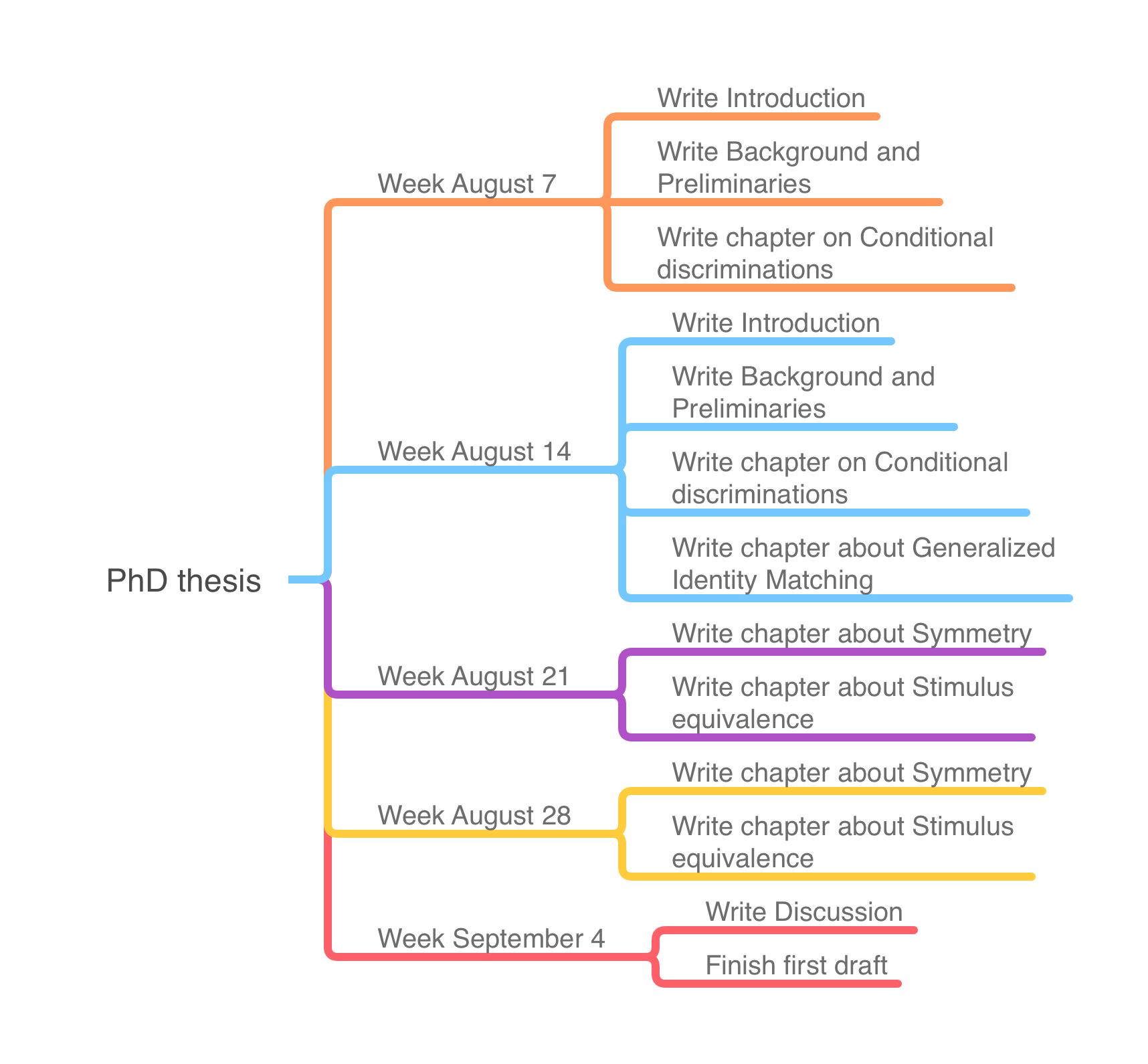My purpose of writing this blog is to help me achieve my goal, which is to have finished a draft of my PhD thesis in Computer Science. I will aim to have it finished in 31 days, starting today on August 7th 2023.
In this post, I will reflect on the goal that I have set. What I write below is inspired by Locke’s Goal-Setting Theory, as described on the MindTools website.
The website recommends goals to be set to be SMART: Specific, Measurable, Attainable, Relevant, and Time-bound.
My specific goal is
Have a finished draft of my Computer Science PhD thesis on September 6th, 2023
Five Principles from Goal-Setting Theory
- Clarity.
- Challenge.
- Commitment.
- Feedback.
- Task complexity.
The below bullet points about each principle are taken from the MindTools website. Under each set of bullet points, I make comments.
1. Clarity
- Write your goal down and be as detailed as possible. Use SMART, and consider putting your goal into the form of a personal mission statement for added clarity.
- Think about how you’ll measure your success toward this goal. What specific metrics will you use?
- Once you’ve set your goal, examine how it makes you feel. Are you excited? Does the challenge motivate you? If you don’t feel strongly about the goal, you might need to clarify it or change it entirely.
My personal mission statement is My goal is to finish a draft of my PhD thesis on September 6th 2023. I will measure the progress using number of written pages, measured by the total number of pages in the current draft minus 27 (it is 27 pages as of Day 0). I feel very excited about this goal!
2. Challenge
- Look at your goal. Is it challenging enough to spark your interest?
- Develop self-discipline, so that you have the persistence to work through problems.
- Identify ways that you can reward yourself when you make progress. Incremental rewards for reaching specific milestones will motivate you to work through challenging tasks.
- Before taking on a major goal, research it thoroughly. This will help you be realistic.
Yes, the goal is challenging enough - to say the least! I make a note about developing self-discipline. Regarding specific milestones, each of the 7 chapters that I have planned (see bottom of this page, and in the PDF draft). Regarding rewards I will remember to celebrate with family and friends, while I make progress. Having planned the writing of this thesis for more than a year, I can certify that I have researched the task thoroughly.
3. Commitment
- Stay committed by using visualization techniques to imagine how your life will look once you’ve achieved your goal.
- Create a treasure map to remind yourself why you should work hard. Visual representations of your goal can help you stay committed, even when the going gets tough.
This kind of visualization technique is something that I have found very powerful previously. I will make a note about using that technique every day. I have also created the below mindmap to visually represent the weeks that I will work on this project. With that said, I also expect to work somewhat in parallel.

4. Feedback
- Schedule time once a week to analyze your progress and accomplishments. Look at what has and hasn’t worked, and make adjustments along the way.
- Learn how to ask for feedback on your progress from others.
- Use technology to track and measure your progress. Apps like Lift are a good place to start.
- Measure progress by breaking difficult or large goals down into smaller chunks, and seek feedback when you reach each milestone.
I will use Fridays to analyze progress and accomplishments, and write about it in the blog posts. I will ask for feedback and help needed from friends and colleagues. I will keep track of the number of pages written to measure progress.
5. Task complexity
- Give yourself plenty of time to accomplish complex goals. Set deadlines that apply an appropriate amount of pressure, while still being achievable.
- If you start to feel stressed about meeting your goals, they might be too complex or unrealistic. Reassess both of these areas and modify your goals if necessary.
- Break large, complex goals down into smaller sub-goals. This will stop you feeling overwhelmed, and it will make it easier to stay motivated.
I notice that this plan might be somewhat unrealistic. Writing a complete thesis in 31 days is a lot. I also plan to do a lot of meditation and physical exercise during the next 31 days, and I won’t do anything that doesn’t make me healthier. One important thing about this though. This challenge is pragmatic given the 31 days. The whole point of it is to write a draft, within that time limit. I am prepared to lower my ambition to make the project fit within these limits. I promise myself to do this challenge in a way that is fun, healthy, resulting in a minimum viable product.
Overall timeplan
Week starting with August 7
- Write Introduction
- Write Background and Preliminaries
- Write chapter on Conditional discriminations
Week starting with August 14
- Write Introduction
- Write Background and Preliminaries
- Write chapter on Conditional discriminations
- Write chapter about Generalized Identity Matching
Week starting with August 21
- Write chapter about Symmetry
- Write chapter about Stimulus equivalence
Week starting with August 28
- Write chapter about Symmetry
- Write chapter about Stimulus equivalence
Week starting with September 4
- Write Discussion
- Finish first draft

